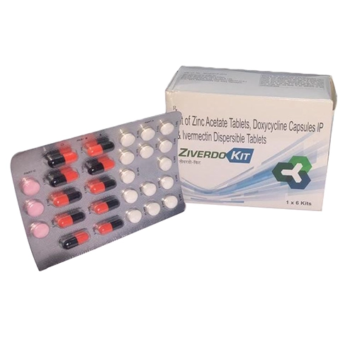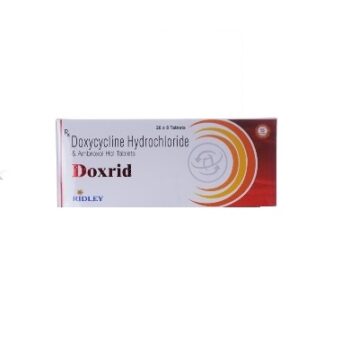Azee 1000 mg
Azee 1000 mg is a medication containing Azithromycin, an antibiotic used to combat bacterial infections. Belonging to the macrolide class, it is prescribed for respiratory tract infections, skin and soft tissue infections, ear infections, and certain sexually transmitted diseases. Azee 1000mg inhibits bacterial growth, thereby treating infections effectively.
It’s crucial to complete the prescribed course even if symptoms improve, ensuring full recovery and reducing the risk of antibiotic resistance. Always follow healthcare provider instructions for optimal use.
What is the generic name of Azee 100 mg?
The generic for Azee is Azithromycin
Available Strengths
Uses of Azee 1000mg
Azee 1000 mg, containing Azithromycin, serves various purposes:
- Respiratory Infections: Treat bacterial infections like bronchitis or pneumonia.
- Skin Infections: Addresses skin and soft tissue infections.
- Ear Infections: Effective against bacterial ear infections.
- Sexually Transmitted Diseases: Used for certain bacterial STDs.
- Other Infections: Prescribed for other bacterial infections, following healthcare provider recommendations for optimal treatment.
Benefits
The benefits of Azee 1000 mg (Azithromycin) lie in its efficacy in treating a range of bacterial infections:
- Effective Treatment: Azee 1000mg effectively combats various bacterial infections, including respiratory, skin, ear, and sexually transmitted infections.
- Convenience: Its once-daily dosage provides convenience in treatment adherence.
- Broad-Spectrum: Covers a wide array of bacterial strains, offering effectiveness against multiple types of infections.
- Reduced Spread: By effectively treating infections, it helps prevent their spread to others.
- Quick Relief: Provides relief from symptoms associated with bacterial infections, aiding in a quicker recovery.
It’s crucial to complete the prescribed course to ensure the complete eradication of the infection and reduce the risk of bacterial resistance.
How to use Azee(Azithromycin) 1000mg?
Azee 1000 mg, Azithromycin, is typically taken orally as directed by a healthcare provider. It’s usually a single dose, best taken on an empty stomach or at least one hour before or two hours after a meal.
Swallow the tablet whole with a full glass of water. Follow healthcare provider instructions regarding dosage and duration for effective treatment of bacterial infections.
How does Azee(Azithromycin) 1000mg work?
Azee 1000 mg (Azithromycin) functions by inhibiting bacterial protein synthesis, specifically targeting the bacteria’s ability to produce essential proteins needed for their growth.
By binding to bacterial ribosomes, Azithromycin impedes protein production, halting bacterial replication. This action weakens and eventually eradicates the bacteria, aiding in the treatment of various infections caused by susceptible bacterial strains.
Doses
Azee (Azithromycin) doses vary based on the type and severity of the infection. For many infections, a common dose is 500 mg to 2000 mg taken as a single dose or divided over a few days. Always adhere to the prescribed dosage and duration provided by a healthcare provider for effective treatment and to prevent antibiotic resistance.
Missed Dose
If a dose of Azithromycin 1000 mg (Azee) is missed, take it as soon as remembered. However, if it’s close to the next scheduled dose, skip the missed dose and continue with the regular dosing schedule. Avoid doubling doses to compensate for a missed one.
Overdose
In case of an overdose with Azithromycin 1000mg (Azee), seek immediate medical attention or contact a poison control center. Overdose symptoms may include severe nausea, vomiting, or diarrhea, requiring prompt medical evaluation.
Side Effects of Azithromycin 1000 mg
Common side effects of Azithromycin 1000mg (Azee) may include:
- Gastrointestinal Issues: Nausea, vomiting, diarrhea, or abdominal pain.
- Headache: Mild to moderate headaches.
- Dizziness: Feeling lightheaded or dizzy.
- Skin Reactions: Rash, itching, or sensitivity to sunlight.
- Rare but Serious: Severe allergic reactions, liver problems, or irregular heartbeat.
Seek medical attention if any severe or persistent side effects occur while using Azithromycin 1000 mg.
When Avoid using Azithromycin 1000 mg (Azee)?
Avoid using Azithromycin 1000 mg (Azee) if:
- Allergic Reactions: If there’s a history of severe allergic reactions to Azithromycin or related antibiotics like erythromycin or clarithromycin.
- Liver Conditions: In the presence of severe liver impairment, Azithromycin may exacerbate existing liver issues.
- Heart Rhythm Issues: If there’s a known history of irregular heart rhythms (arrhythmias) or prolonged QT intervals.
Things to tell your doctor
When consulting your doctor about Azithromycin 1000mg (Azee), inform them about:
- Medical History: Share any medical conditions or past reactions to medications, especially related to antibiotics.
- Medication List: Provide a comprehensive list of current medications, including prescriptions, over-the-counter drugs, supplements, or herbal remedies.
- Allergies: Mention any known allergies or adverse reactions to medications or substances.
- Pregnancy/Breastfeeding: If pregnant, planning pregnancy, or breastfeeding, discuss the potential risks and benefits of Azithromycin use.
- Recent Procedures: Inform about any upcoming surgeries or recent medical procedures.
- Symptoms: Report any unusual or severe symptoms experienced while taking Azithromycin.
Frequently Asked Question
What is Azithromycin 1000 mg used for?
It’s an antibiotic used to treat bacterial infections like respiratory, skin, ear, and sexually transmitted infections.
How does (Azee)Azithromycin 1000mg work?
It inhibits bacterial protein synthesis, halting bacterial growth and aiding in infection treatment.
What are the common side effects?
Common side effects include gastrointestinal issues, headache, dizziness, skin reactions, and rarely, severe allergic reactions.
How should I take Azithromycin 1000 mg?
Take as directed by a healthcare provider, usually as a single dose, on an empty stomach, or as prescribed.
Can I use Azithromycin for viral infections like the flu?
No, it’s ineffective against viral infections like the flu; it’s specifically for bacterial infections.
Is it safe during pregnancy?
Consult a healthcare provider; they’ll weigh the risks and benefits for your specific situation.
Conclusion
Azithromycin 1000 mg (Azee) serves as an effective antibiotic for treating various bacterial infections, including respiratory, skin, ear, and sexually transmitted infections. While offering beneficial treatment, it’s crucial to adhere to prescribed dosages, complete the course as directed, and promptly report any concerning symptoms to a healthcare provider.











Reviews
There are no reviews yet.